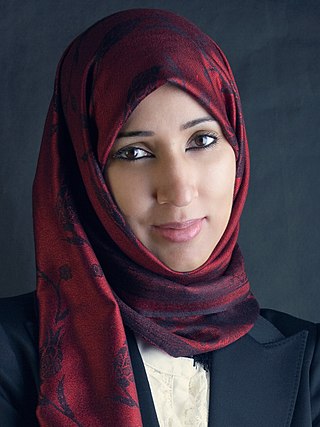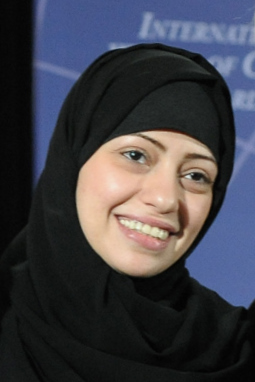Related Research Articles

Human rights in Saudi Arabia are a topic of concern and controversy. Known for its executions of political protesters and opponents, the government of the Kingdom of Saudi Arabia has been accused of and denounced by various international organizations and governments for violating human rights within the country. An absolute monarchy under the House of Saud, the government is consistently ranked among the "worst of the worst" in Freedom House's annual survey of political and civil rights and was in 2023 ranked as the world's most authoritarian regime.

Women's rights in Saudi Arabia is a topic of international concern and controversy. Women in Saudi Arabia experience widespread discrimination in Saudi politics, economy and society.
Wajeha al-Huwaider is a Saudi activist and writer, who played a key role in the anti male-guardianship and women to drive campaigns during the early twenty-first century. She is a co-founder of the Association for the Protection and Defense of Women's Rights in Saudi Arabia. As a result of her work, al-Huwaider has been the recipient of both significant legal prosecution in Saudi Arabia and international praise.

Eman al-Nafjan is a Saudi Arabian blogger and women's rights activist. She was detained by Saudi authorities in May 2018 along with Loujain al-Hathloul and five other women's rights activists in what Human Rights Watch interpreted as an attempt to frighten the activists, during the 2018–2019 Saudi crackdown on feminists.

Manal al-Sharif is a Saudi women's rights activist who helped start a right-to-drive campaign in 2011. Wajeha al-Huwaider filmed al-Sharif driving a car as part of the campaign. The video was posted on YouTube and Facebook. Al-Sharif was detained on 21 May 2011, released, and rearrested the following day. On 30 May, al-Sharif was released on bail, on the conditions of returning for questioning if required, not driving, and not talking to the media. The New York Times and Associated Press associated the women's driving campaign as part of the Arab Spring and the long duration of al-Sharif's detention due to Saudi authorities' fear of protests.
Hatoon Ajwad al-Fassi is a Saudi Arabian historian, author and women's rights activist. She is an associate professor of women's history at King Saud University in Saudi Arabia, where she has been employed since 1989 and at the International Affairs Department at Qatar University. At the university, al-Fassi carries out historical research. Based on her research into the pre-Islamic Arabian kingdom of Nabataea, al-Fassi claims that women in the ancient kingdom had more independence than women in modern Saudi Arabia. Al-Fassi was active in women's right to vote campaigns for the 2005 and 2011 municipal elections and was active in a similar campaign for the 2015 municipal elections. She was arrested in late June 2018 as part of a crackdown on women's rights activists and was released almost a year later, in early May 2019.

The legal system of Saudi Arabia is based on Sharia, Islamic law derived from the Quran and the Sunnah of the Islamic prophet Muhammad. The sources of Sharia also include Islamic scholarly consensus developed after Muhammad's death. Its interpretation by judges in Saudi Arabia is influenced by the medieval texts of the literalist Hanbali school of Fiqh. Uniquely in the Muslim world, Sharia has been adopted by Saudi Arabia in an uncodified form. This, and the lack of judicial precedent, has resulted in considerable uncertainty in the scope and content of the country's laws. The government therefore announced its intention to codify Sharia in 2010, and, in 2018, a sourcebook of legal principles and precedents was published by the Saudi government. Sharia has also been supplemented by regulations issued by royal decree covering modern issues such as intellectual property and corporate law. Nevertheless, Sharia remains the primary source of law, especially in areas such as criminal, family, commercial and contract law, and the Qur'an and the Sunnah are declared to be the country's constitution. In the areas of land and energy law the extensive proprietorial rights of the Saudi state constitute a significant feature.

Until June 2018, Saudi Arabia was the only country in the world in which women were forbidden from driving motor vehicles. The Women to Drive Movement was a campaign by Saudi women, whom the government denies many rights to which men are entitled, for the right to drive motor vehicles on public roads. Dozens of women drove in Riyadh in 1990 and were arrested and had their passports confiscated. In 2007, Wajeha al-Huwaider and other women petitioned King Abdullah for the right to drive, and a film of al-Huwaider driving on International Women's Day 2008 attracted international media attention.

The following is a timeline of the 2011–2012 Saudi Arabian protests from May to December 2011. The 2011–2012 Saudi Arabian protests are a series of ongoing protests taking place in Saudi Arabia, which began in January 2011, influenced by concurrent protests in the region.

The following is a timeline of the 2011–2012 Saudi Arabian protests from January to June 2012. The 2011–2012 Saudi Arabian protests are a series of ongoing protests taking place in Saudi Arabia, which began in January 2011, influenced by concurrent protests in the region.

Samar bint Muhammad Badawi is a Saudi Arabian human rights activist. She and her father filed court cases against each other in Saudi Arabia. Badawi's father accused her of disobedience under the Saudi Arabian male guardianship system and she charged her father with adhl—"making it hard or impossible for a person, especially a woman, to have what she wants, or what's rightfully hers; e.g, her right to marry" according to Islamic jurisprudence—for refusing to allow her to marry. After Badawi missed several trial dates relating to the charge, an arrest warrant was issued for her, and Badawi was imprisoned on 4 April 2010. In July 2010, Jeddah General Court ruled in Samar Badawi's favor, and she was released on 25 October 2010, and her guardianship was transferred to an uncle. There had been a local and international support campaign for her release. The Saudi NGO Human Rights First Society described Badawi's imprisonment as "outrageous illegal detention".
Mohammad Fahad Muflih al-Qahtani is a human rights activist, economics professor and political prisoner currently jailed at Al-Ha’ir Prison in Riyadh. Prior to his arbitrary 2012 arrest, he co-founded and later led the Saudi Arabia human rights organisation Saudi Civil and Political Rights Association. Alkarama described al-Qahtani as "one of [the Saudi Arabian judiciary's] most eloquent and fervent critics". On 9 March 2013, al-Qahtani was sentenced to ten years in prison followed by a ten-year travel ban, ostensibly for "co-founding an unlicensed civil association". He has carried out several hunger strikes to protest Saudi prison conditions endured during his politically motivated incarceration. As of 2022, he remains jailed and has been intermittently kept in solitary confinement since 2018.

Women played a variety of roles in the Arab Spring, but its impact on women and their rights is unclear. The Arab Spring was a series of demonstrations, protests, and civil wars against authoritarian regimes that started in Tunisia and spread to much of the Arab world. The leaders of Tunisia, Egypt, Libya, and Yemen were overthrown; Bahrain has experienced sustained civil disorder, and the protests in Syria have become a civil war. Other Arab countries experienced protests as well.
The modern history of Saudi Arabia begins with the declaration of the unification of Saudi Arabia in a single kingdom in 1932. This period of time in Saudi Arabia's history includes the discovery of oil in Saudi Arabia and many events. It goes on to encompass Saudi Arabia's brief involvement in World War II in 1945. Afterwards, it includes Saudi Arabia's involvement in the Western Bloc and the Cold War. It also includes Saudi Arabia's proxy conflict with Iran, the Arab Spring, and the ongoing Arab Winter.
The lifetime prevalence of domestic violence in Saudi Arabia is estimated to be between 20%-39% for women, depending on the region in which they live. A 2015 study found that 20% of women visiting primary care centers in Riyadh had experienced domestic violence in the past year.
Walī is an Arabic word primarily meaning primarily "ally", from which other related meanings with Islamic cultural tones derive, such as "ally of God" or "holy man/saint", etc. "Wali" can also mean a "legal guardian", or ruler; someone who has "Wilayah" over somebody else, and in fiqh is often "an authorized agent of the bride in concluding a marriage contract ",

Aziza al-Yousef is a Saudi Arabian women's rights activist and academic. She was detained by Saudi authorities in May 2018 along with Loujain al-Hathloul and five others.
The anti male-guardianship campaign is an ongoing campaign by Saudi women against the requirement under the law to obtain permission from their male guardian for activities such as getting a job, travelling internationally or getting married. Wajeha al-Huwaider deliberately tried to travel internationally without male guardianship permission in 2009 and encouraged other women to do likewise. Women activists wrote a letter to the Saudi Minister of Labor and brought media attention to the issue in 2011. A 14,000-signature petition was given to royal authorities by Aziza al-Yousef in 2016 following a Human Rights Watch report on male guardianship. A crackdown against the activists took place in mid-May 2018, with 13 arrests as of 22 May 2018. Several of the women remained in prison as of December 2018. Some of the women activists were tortured, some of them in the supervision of Saud al-Qahtani, a close advisor of Crown Prince Mohammad bin Salman.
Nassima al-Sadah is a Shia human rights writer and activist from the "restive Shi'ite-majority" eastern province Qatif, Saudi Arabia. She has "campaigned for civil and political rights, women's rights and the rights of the Shi'a minority" in the eastern province Qatif, Saudi Arabia for many years. She ran as a candidate in the 2015 Saudi Arabian municipal elections but was disqualified. Sadah and another prominent activist, Samar Badawi, were arrested on July 30, 2018, by Saudi authorities in a broader "government crackdown" on "activists, clerics and journalists."
Feminism in Saudi Arabia dates back to the ancient, pre-Roman Nabataean Kingdom in which women were independent legal persons. Twenty-first century feminist movements in Saudi Arabia include the women to drive movement and the anti male-guardianship campaign. Madawi al-Rasheed argued in 2019 that the Saudi feminist movement was "the most organised and articulate civil society" in Saudi Arabia.
References
- ↑ "2008 Human Rights Report: Saudi Arabia". United States State Department. 2009-02-25. Archived from the original on 2011-05-28. Retrieved 2011-05-23.
- ↑ "Saudi Feminist Wajeha Al-Huweidar: The Campaign for Women's Right to Drive Saudi Arabia Is Just the Beginning". MEMRI. Retrieved 2019-06-06.
- ↑ "Untitled 1". Archived from the original on 2011-07-24. Retrieved 2010-06-20.
- ↑ "Untitled 1". Archived from the original on 2010-07-15. Retrieved 2010-06-20.